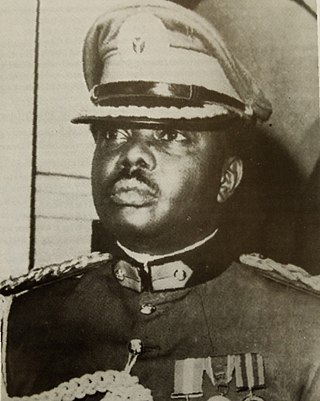
Murtala Ramat Muhammed ; 8 November 1938 – 13 February 1976) was a Nigerian military officer and the fourth head of state of Nigeria. He led the 1966 Nigerian counter-coup in overthrowing the military regime of Johnson Aguiyi-Ironsi and featured prominently during the Nigerian Civil War and thereafter ruled Nigeria from 29 July 1975 until his assassination on 13 February 1976. This period in Nigerian history, from the Northern counter-coup victory to Murtala's death, is commonly associated with the institutionalization of the military in Nigerian politics.

The president of Nigeria, officially the president of the Federal Republic of Nigeria, is the head of state and head of government of the Federal Republic of Nigeria. The president directs the executive branch of the Federal Government and is the commander-in-chief of the Nigerian Armed Forces.

The military dictatorship in Nigeria was a period when members of the Nigerian Armed Forces held power in Nigeria from 1966 to 1999 with an interregnum from 1979 to 1983. The military was able to rise to power often with the tacit support of the elite through coups d'état. Since the country became a republic in 1963, there had been a series of military coups.

George Agbazika Innih was a Nigerian Army general and statesman. He was the military governor of Bendel and Kwara States.
Sani Bello is a Nigerian statesman and military administrator who served as Governor of Kano State from 1975 to 1978. After his retirement, he amassed an enormous fortune through investments in oil, telecommunications and electricity; going on to establish the Sani Bello Foundation.
Ibrahim Taiwo was a Military Governor of Kwara State from July 1975 to February 1976 during the military regime of General Murtala Mohammed. He assisted in establishment of the University of Ilorin, which was founded by decree August, 1975.
Abdullahi Shelleng was the first Military Governor of Benue State during the military regime of General Olusegun Obasanjo, after Benue State had been split from the old Benue-Plateau State. He ruled from 3 February 1976 to July 1978.

Mohammed Bello Kaliel was a Nigerian Army Colonel and the first Governor of Bauchi State, Nigeria after it was created on 3 February 1976 when North-Eastern State was divided into Bauchi, Borno, and Gongola states, during the military regime of General Olusegun Obasanjo. He held office until July 1978.
Paul Chabri Tarfa is a retired Nigerian army major general who was appointed Governor of Oyo State, during the military regime of General Olusegun Obasanjo, handing over to the elected civilian governor Bola Ige.
Mohammed Chris Alli was a Nigerian Army major general who served as Chief of Army Staff from 1993 to 1994 under General Sani Abacha's regime and was military governor of Plateau State Nigeria from August 1985 to 1986 during the military regime of General Ibrahim Babangida. Many years later, he was appointed interim administrator of the state during a 2004 crisis in the state following ethno-religious killings in Shendam, Yelwa Local Government.

Husaini Abdullahi was the military governor of Bendel State, Nigeria from March 1976 to July 1978 during the military regime of General Olusegun Obasanjo.
Major General Saidu Ayodele Balogun, is a retired Nigerian general who appointed the first Governor of Ogun State, Nigeria after it was formed from part of the old Western State in March 1976, holding office until July 1978 during the military regime of General Olusegun Obasanjo.
Colonel Anthony Aboki Ochefu was a Military Governor of East Central State from July 1975 to February 1976 during the military regime of General Murtala Mohammed.
Abdullahi Mohammed is a retired Nigerian Army major general, who served as chief of staff to presidents Olusegun Obasanjo and Umaru Musa Yar'Adua from 1999 to 2008; National Security Adviser to General Abdusalami Abubakar from 1998 to 1999; Director General of the National Security Organization from 1976 to 1979; and Governor of Benue-Plateau State, Nigeria from July 1975 to February 1976 during the military regime of General Murtala Mohammed.
Usman Jibrin was a Nigerian politician and military officer who served as the military governor of North-Central State from July 1975 to 1977 during the military regime of General Murtala Mohammed.
Muktar Muhammed was the military governor of Kaduna State, Nigeria from July 1978 to October 1979 during the military regime of General Olusegun Obasanjo. Wing commander Muktar Muhammed played an active role in the coup that brought General Murtala Mohammed to power, and was appointed to the new Supreme Military Council on 30 July 1975. He was appointed governor of Kaduna State in 1977, in which position he was promoted to Group Captain. He retired from the Service of the Nigerian Air Force at the rank of Air Vice Marshal (AVM).
General Murtala Muhammed became head of state in Nigeria on 29 July 1975, when he assumed power after a coup that deposed General Yakubu Gowon. On assuming office, he replaced the military governors of the twelve states that had been appointed by his predecessor. On 13 February 1976 he was assassinated in an attempted coup, and replaced by General Olusegun Obasanjo, who replaced most of his appointees.
The Invasion of Umuahia was a military conflict during the Biafran War between Nigerian and Biafran soldiers. The Invasion of Umuahia occurred during the final stages of the Civil War and happened eight months prior to the Biafran surrender.

New Karshi is a town in Karu Local Government Area of Nasarawa State, Nigeria, founded in the 1980s by Muhammadu Bako II. It is a semi-autonomous local government created out of Karu LGA as Karshi Development area with the administrative secretariat in Uke. Karshi has a local government chairman as its administrative head and a seat in the Nasarawa State House of Assembly. Emir of Karshi Emirate, Alhaji (Dr) Muhammadu Sani Bako III, a first class chief is the traditional head of New Karshi. It has a population of about 30,000 people. The predominant tribes are Gwandara, Gbagyi, Gade, Bassa and Hausa.






